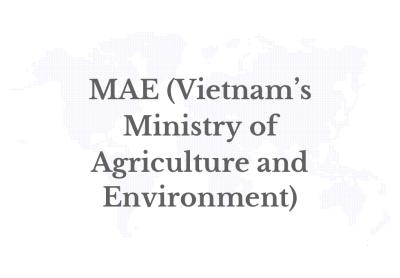WASHINGTON D.C, USA - Media OutReach Newswire - 1 June 2025 - Vietnam’s Minister of Agriculture and Environment Do Duc Duy plans to lead a delegation with nearly 50 agencies, agribusinesses and associations to explore opportunities to promote trade and import agrifood and timber from the United States during June 1-7, 2025. The delegation expects to participate in business dialogues in Iowa, Ohio, and Washington D.C. Vietnamese agribusinesses are ready to seek U.S. partners to purchase US commodities such as animal feed, fertilizers, biopesticides, meat products, frozen marine seafood, and raw timber.
Deepening the Comprehensive Strategic Partnership
The visit aims to boost bilateral trade and create new opportunities for Vietnam to import more agrifood and timber from the U.S., helping to balance trade between the two countries. Besides trade, the Vietnamese delegation expects to access to new technologies, hence improving the competitiveness of their own value chains.
According to Minister Do Duc Duy, both Vietnam and the U.S. have strong agricultural sectors, but their strengths complement rather than compete with each other. “With active support of both Vietnam and US government, Vietnam’s and US’s agriculture have been increasingly connected. Even we’re now sharing the same supply chains, boosting our competitiveness, thereby supporting both producers and consumers in each country”. The Minister emphasized, “Vietnamese agribusinesses have cooperated strongly with the Government to increase the purchase of agrifood and timber products from the U.S. This effort helps balance bilateral trade and strengthens the agricultural supply chain between the two countries, hence contributing to global food security.”
Earlier, in September 2024, the largest U.S. agribusiness delegation in history visited Hanoi to mark the one-year anniversary of the Vietnam–US Comprehensive Strategic Partnership. Led by USDA Deputy Secretary Alexis Taylor, the delegation was consisted of representatives from nine state governments, 35 businesses, and 25 major industry associations. Their visit underscored the growing interest of U.S. businesses in Vietnam market.
Beyond boosting trade, both countries work to build inclusive development, enhance rural resilience, and promote sustainable production and clean energy. A key highlight is the “International Year of Women Farmers 2026” initiative, co-led by the U.S. and Vietnam and adopted by a United Nations resolution in May 2024. Following the resolution, Vietnam’s Ministry of Agriculture and Environment partnered with the U.S. Mission to ASEAN and the USDA to launch the initiative with a series of events. As part of the program, two American female farmers – Jennifer Schmidt and Jaclyn Wilson – traveled to Southeast Asia to engage with other female farmers, with Vietnam as their first destination.
Driving global economic growth
Today, American consumers increasingly choose Vietnamese agrifood, especially spices, fruits, seafood, and furniture. Meanwhile, Vietnamese producers rely more on U.S. imports, including cornmeal, soybeans, meat, dairy, lumber, livestock equipment, and seedlings.
Vietnam’s farmers are enhanced with better skills and knowledge to adopt advanced American technologies to boost production, improve produce quality and protect the environment. High-quality materials and cutting-edge technologies from the U.S. are helping Vietnam build more competitive and sustainable supply chains.
Vietnam’s agriculture continues to deepen partnerships with U.S. stakeholders, from federal and state governments to associations and businesses. The Ministry of Agriculture and Environment has signed multiple agreements with U.S. authorities and state governments. Vietnamese agribusinesses have signed 18 Memorandums of Understanding since 2020 to purchase agrifood from the U.S., totaling 6 billion USD, with half already implemented.
Recently, the Ministry of Agriculture and Environment has created favorable conditions for U.S. agricultural exporters to enter the Vietnam market. Vietnam has completed registration procedures for 509 meat and meat exporters and 232 seafood exporters from US to Vietnam; no backlog remains to be processed. Both countries are actively working to open their fruit markets to each other, enabling exporters to reach new customers and for consumers to enjoy the distinctive flavors of both tropical and temperate regions.
Vietnam is also among the first eight Asian countries to approve biotechnology-based plant seeds from the U.S. So far, it has approved all 61 biotechnology applications dossiers submitted by U.S. companies. The two sides have also agreed on transparent and practical methods, procedures, and protocols for animal and plant quarantine. These agreements help pave the way for the development of the agrifood markets in both countries. In addition, the new Decree 73/2025/ND-CP, effective from March 31, 2025, cuts import tarriff to 0% for agrifood products that US has strong competiveness. As a result, agricultural exports from both sides have grown steadily, by around 10% annually over the past decade.
Holistic and sustainable cooperation
The visit of Vietnam’s Ministry of Agriculture and Environment delegation to the U.S. in June 2025 reflects Vietnam’s strong commitment to building trust and strengthening strategic partnerships by promoting the shared agricultural supply chains of the two countries. The visit also aims to deepen the Comprehensive Strategic Partnership as the two countries celebrate 30 years of diplomatic relations.
In an interview with Vietnamese press, the USDA emphasized: “Any agricultural trade imbalances are largely sector-specific and influenced by factors such as regulations, consumer demand, and supply chain dynamics. Ensuring reciprocal market access and reducing tariffs remain top priorities to sustain long-term trade growth.”
Dr. Nguyen Do Anh Tuan, General Director of the International Cooperation Department under Vietnam’s Ministry of Agriculture and Environment, expressed concern over President Trump administration’s announcement of a 10% tariff from April 2, 2025, and the potential for a 46% reciprocal tariff on Vietnamese exports from July 9, 2025. This tarriff imposition has alarmed not only Vietnamese exporters but also American businesses.
Dr. Tuan explained: “Beyond shrinking profit margins and weakening business competitiveness on both sides, higher reciprocal tariffs will raise prices for essential food products in the U.S. This action not only hurts American consumers but also potentially disrupts the supply chain that both governments and private sectors of both sides have worked hard to build in recent years. Agrifood is a necessity goods, and hiking price of agrifood will significantly burden American average-income households.”
The issuer is solely responsible for the content of this announcement.









